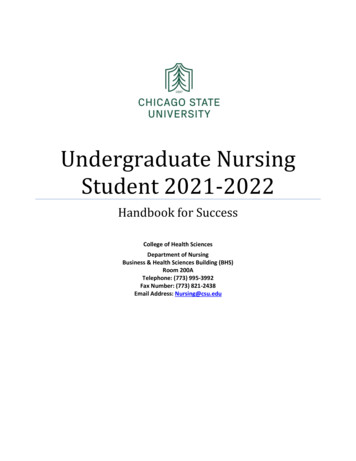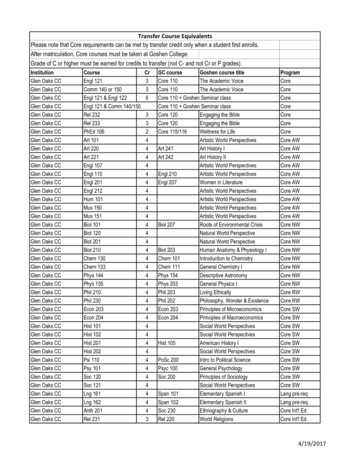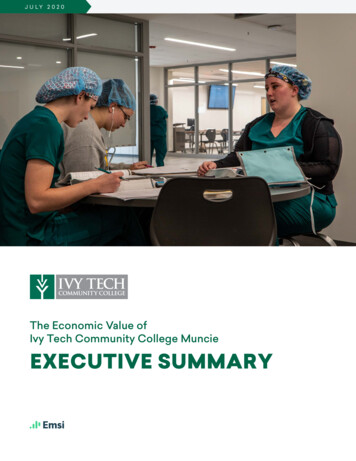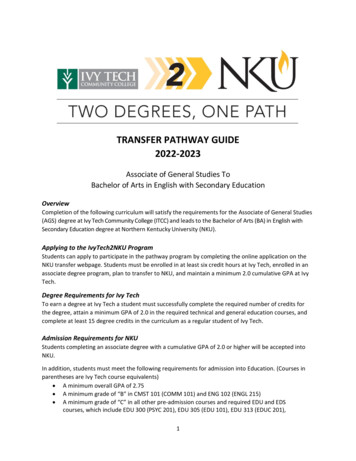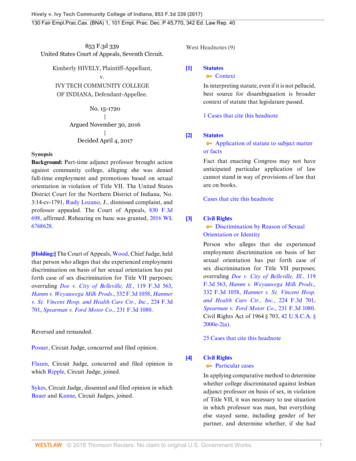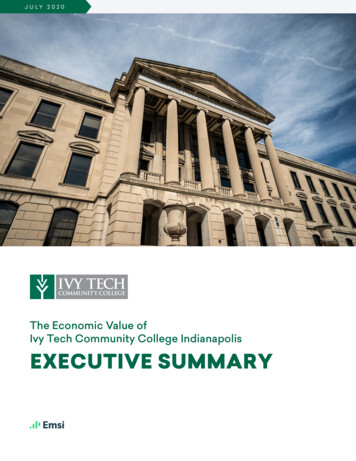
Transcription
J U LY 2 0 2 0The Economic Value ofIvy Tech Community College IndianapolisEXECUTIVE SUMMARY
IV Y Tech Community College Indianapolis (Ivy Tech Indianapolis) createsvalue in many ways. The campus plays a key role in helping students increasetheir employability and achieve their individual potential. The campus retainsstudents in the region, generating new dollars and opportunities for the India-I N D I A N A P O L I S CA M P U SSERVICE REGIONnapolis Campus Service Region.* Ivy Tech Indianapolis providesstudents with the education, training, and skills they need to havefulfilling and prosperous careers. Furthermore, Ivy Tech Indianapolis is a place for students to meet new people, increase theirIvy Tech Indianapolis influencesself-confidence, and promote their overall health and well-being.both the lives of its studentsIvy Tech Indianapolis influences both the lives of its students andand the regional economy.the regional economy. The campus supports a variety of industries in the Indianapolis Campus Service Region, serves regionalbusinesses, and benefits society as a whole in Indiana from anexpanded economy and improved quality of life. The benefits created by IvyTech Indianapolis even extend to the state government through increased taxrevenues and public sector savings.This study measures the economic impacts created by Ivy Tech Indianapolison the business community and the benefits the campus generates in returnfor the investments made by its key stakeholder groups—students, taxpayers,and society. The following two analyses are presented:Economic impact analysisInvestment analysisAll results reflect Ivy Tech Indianapolis employee, student, and financial data,provided by Ivy Tech Community College, for fiscal year (FY) 2018-19. Impactson the Indianapolis Campus Service Region economy are reported under theeconomic impact analysis and are measured in terms of added income. Thereturns on investment to students, taxpayers, and society in Indiana are reportedunder the investment analysis.*For the purposes of this analysis, the Indianapolis Campus Service Region is comprised of the following counties:Boone, Hamilton, Hancock, Hendricks, Johnson, Marion, and Shelby.Introduction 2
Economic impact analysisIvy Tech Indianapolis promotes economic growth in the Indianapolis CampusService Region through its direct expenditures and the resulting expendituresI M PAC T S C R E AT E D B Y I V Y T E C HI N D I A N A P O L I S I N F Y 2 018 -19of students and regional businesses. The campus serves as an employer andbuyer of goods and services for its day-to-day and construction operations.The campus’ activities retain students in the Indianapolis Campus ServiceRegion, whose expenditures benefit regional vendors. In addition, Ivy TechIndianapolis is a primary source of higher education to the Indianapolis Campus 72.7 millionOperations Spending ImpactService Region residents and a supplier of trained workers to regional industries,enhancing overall productivity in the regional workforce.Operations spending impact 2.8 millionConstruction Spending ImpactIvy Tech Indianapolis adds economic value to the IndianapolisCampus Service Region as an employer of regional residents and alarge-scale buyer of goods and services. In FY 2018-19, the campusemployed 1,390 full-time and part-time faculty and staff, 88% of whom lived in 17.4 millionStudent Spending Impactthe Indianapolis Campus Service Region. Total payroll at Ivy Tech Indianapoliswas 57 million, much of which was spent in the region for groceries, mortgageand rent payments, dining out, and other household expenses. In addition, thecampus spent 37.4 million on day-to-day expenses related to facilities, sup- 588.7 millionAlumni Impactplies, and professional services.Ivy Tech Indianapolis’ day-to-day operations spending added 72.7 millionin income to the region during the analysis year. This figure represents thecampus’ payroll, the multiplier effects generated by the in-region spendingof the campus and its employees, and a downward adjustment to account forfunding that the campus received from regional sources. The 72.7 million inadded income is equivalent to supporting 1,530 jobs in the region.Construction spending impactIvy Tech Indianapolis invests in construction each year to maintain 681.6 millionTOTAL IMPACT– OR –8,667JOBS SUPPORTEDits facilities, create additional capacities, and meet its growing educational demands. While the amount varies from year to year, thesequick infusions of income and jobs have a substantial impact on the regionaleconomy. In FY 2018-19, Ivy Tech Indianapolis’ construction spending generated 2.8 million in added income, which is equivalent to supporting 37 jobs.Student spending impactSome in-region students, referred to as retained students, wouldhave left the Indianapolis Campus Service Region if not for the existence of Ivy Tech Indianapolis. While attending the campus, theseEconomic impact analysis3
retained students spent money on groceries, accommodation, transportation,and other household expenses. This spending generated 17.4 million in addedincome for the regional economy in FY 2018-19, which supported 389 jobs inAlumni impactThe education and training Ivy Tech Indianapolis provides forregional residents has the greatest impact. Since its establishment,students have studied at Ivy Tech Indianapolis and entered theregional workforce with greater knowledge and new skills. Today, thousandsof former Ivy Tech Indianapolis students are employed in the IndianapolisCampus Service Region. As a result of their Ivy Tech Indianapolis educations,the students receive higher earnings and increase the productivity of the businesses that employ them. In FY 2018-19, Ivy Tech Indianapolis alumni generated 588.7 million in added income for the regional economy, which is equivalentto supporting 6,710 jobs.Total impact1,349100 72 51 40 35the Indianapolis Campus Service Region.I V Y T E C H I N D I A N A P O L I S I M PAC T SBY INDUSTRY (JOBS SUPPORTED)Health Care & Social Assistance968Retail Trade682Construction538Government, Non-Education471ManufacturingIvy Tech Indianapolis added 681.6 million in income to the Indianapolis Campus Service Region economy during the analysis year, equal to the sum of theoperations and construction spending impacts, the student spending impact,and the alumni impact. For context, the 681.6 million impact was equal toapproximately 0.5% of the total gross regional product (GRP) of the IndianapolisCampus Service Region.Ivy Tech Indianapolis’ total impact can also be expressed in terms of jobssupported. The 681.6 million impact supported 8,667 regional jobs, usingthe jobs-to-sales ratios specific to each industry in the region. In addition, the 681.6 million, or 8,667 supported jobs, stemmed from different industry sectors. Among non-education industry sectors, Ivy Tech Indianapolis’ spendingand alumni in the Health Care & Social Assistance industry sector supported1,349 jobs in FY 2018-19. These are impacts that would not have been generatedwithout the campus’ presence in the Indianapolis Campus Service Region.Economic impact analysis4
Investment analysisAn investment analysis evaluates the costs associated with a proposed venture against its expected benefits. If the benefits outweigh the costs, then theinvestment is financially worthwhile. The analysis presented here considers IvyTech Indianapolis as an investment from the perspectives of students, taxpayers, and society in Indiana.Student perspectiveIn FY 2018-19, Ivy Tech Indianapolis served 24,650 credit and 651S T U D E N T S S E E A H I G H R AT E O FRETURN FOR THEIR INVESTMENTIN IVY TECH INDIANAPOLISnon-credit students. In order to attend the campus, the studentspaid for tuition, fees, books, and supplies. They also took out loansand will incur interest on those loans. Additionally, students gave up money34 20 217.1%they would have otherwise earned had they been working instead of attendingAverage annual return forIvy Tech Indianapolis studentscollege. The total investment made by Ivy Tech Indianapolis’ students in FY2018-19 amounted to a present value of 130.7 million, equal to 46.1 million9.9%in out-of-pocket expenses (including future principal and interest on studentStock market 30-yearaverage annual returnloans) and 84.6 million in forgone time and money.In return for their investment, Ivy Tech Indianapolis’ students will receive a stream0.8%of higher future earnings that will continue to grow throughout their workingInterest earned on savings account(National Rate Cap)lives. For example, the average Ivy Tech Indianapolis associate degree graduatefrom FY 2018-19 will see annual earnings that are 11,000 higher than a personwith a high school diploma or equivalent working in Indiana. Over a workingSource: Forbes’ S&P 500, 1989-2018. FDIC.gov, 6-2019.lifetime, the benefits of the associate degree over a high school diploma willamount to an undiscounted value of 440 thousand in higher earnings pergraduate. The present value of the cumulative higher future earnings that IvyTech Indianapolis’ FY 2018-19 students will receive over their working careersis 519.6 million.The average associate degree graduate from Ivy Tech Indianapoliswill see an increase in earnings of 11,000 each year compared to aperson with a high school diploma or equivalent working in Indiana.45 586777 100 High schoolHigh schoolCertificateAssociateBachelor’s 26,400 34,500 39,700 45,500 59,100Source: Emsi employment data.Investment analysis5
The students’ benefit-cost ratio is 4.0. In other words, for every dollar studentsinvest in Ivy Tech Indianapolis, in the form of out-of-pocket expenses and forgone time and money, they will receive a cumulative value of 4.00 in higherfuture earnings. Annually, the students’ investment in Ivy Tech Indianapolis hasan average annual internal rate of return of 17.1%, which is impressive comparedto the U.S. stock market’s 30-year average rate of return of 9.9%.STUDENT PERSPECTIVE 519.6 millionPresent value benefits 130.7 millionTaxpayer perspectivePresent value costsIvy Tech Indianapolis generates more in tax revenue than it takes.These benefits to taxpayers consist primarily of taxes that the stategovernment will collect from the added revenue created in thestate. As Ivy Tech Indianapolis students will earn more, they will make highertax payments throughout their working lives. Students’ employers will also 388.9 millionNet present valueBenefit-cost ratioRate of return4.017.1%make higher tax payments as they increase their output and purchases ofgoods and services. By the end ofthe FY 2018-19 students’ workinglives, the state government willhave collected a present valueFor every dollar of publicof 153.8 million in added taxes.money invested inBenefits to taxpayers will alsoIvy Tech Indianapolis,consist of savings generatedtaxpayers will receive aby the improved lifestyles of IvyTech Indianapolis students andcumulative value of 2.30the corresponding reduced gov-over the course of theernment services. Education isstatistically correlated with a vari-students’ working lives.TAXPAYER PERSPECTIVE 164.4 millionPresent value benefits 71.4 millionPresent value costs 93 millionNet present valueBenefit-cost ratioRate of return2.36.7%ety of lifestyle changes. Students’Ivy Tech Indianapolis educationswill generate savings in three main categories: 1) healthcare, 2) crime, and3) income assistance. Improved health will lower students’ demand for nationalhealth care services. In addition, students will be less likely to interact with thecriminal justice system, resulting in a reduced demand for law enforcement andSOCIAL PERSPECTIVE 2.3 billionvictim costs. Ivy Tech Indianapolis students will be more employable, so theirPresent value benefitsreduced demand for income assistance such as welfare and unemployment 202.5 millionbenefits will benefit taxpayers. For a list of study references, contact Ivy TechCommunity College for a copy of the college-wide main report. Altogether, thepresent value of the benefits associated with an Ivy Tech Indianapolis education will generate 10.6 million in savings to state taxpayers.Total taxpayer benefits amount to 164.4 million, the present value sum of thePresent value costs 2.1 billionNet present valueBenefit-cost ratioRate of return11.2n/a*added taxes and public sector savings. Taxpayer costs are 71.4 million, equalto the amount of state government funding Ivy Tech Indianapolis receivedin FY 2018-19. These benefits and costs yield a benefit-cost ratio of 2.3. This* The rate of return is not reported for the social perspective because the beneficiaries of the investmentare not necessarily the same as the original investors.means that for every dollar of public money invested in Ivy Tech IndianapolisInvestment analysis6
in FY 2018-19, taxpayers will receive a cumulative value of 2.30 over the courseof the students’ working lives. The average annual internal rate of return fortaxpayers is 6.7%, which compares favorably to other long-term investmentsin the public and private sectors.Social perspectiveSociety as a whole in Indiana benefits from the presence of IvyTech Indianapolis in two major ways. Primarily, society benefitsfrom an increased economic base in the state. This is attributed tohigher student earnings and increased business output, which raise economicprosperity in Indiana.Benefits to society also consist of the savings generated by the improvedlifestyles of Ivy Tech Indianapolis students. As discussed in the previous section, education is statistically correlated with a variety of lifestyle changes thatgenerate social savings. Note that these costs are avoided by the consumers but are distinct from the costs avoided by the taxpayers outlined above.Healthcare savings include avoided medical costs associated with smoking,alcohol dependence, obesity, drug abuse, and depression. Savings related tocrime include reduced security expenditures and insurance administration,lower victim costs, and reduced expenditures by the criminal justice system.SOCIAL BENEFITS IN INDIANAFROM IVY TECH INDIANAPOLISSocial savings 44.9 million98 2 P98 2.3 billionTotal benefitsto societyAdded income 2.2 billionIncome assistance savings include reduced welfare and unemployment claims.For a list of study references, contact Ivy Tech Community College for a copyof the college-wide main report.Altogether, the social benefits of Ivy Tech Indianapolis equal a present value of 2.3 billion. These benefits include 2.2 billion in added income through students’increased lifetime earnings and increased business output, as well as 44.9 million in social savings related to health, crime, and income assistance in Indiana.People in Indiana invested a present value total of 202.5 million in Ivy TechIndianapolis in FY 2018-19. The cost includes all the campus and student costs.The benefit-cost ratio for society is 11.2, equal to the 2.3 billion in benefitsdivided by the 202.5 million in costs. In other words, for every dollar investedin Ivy Tech Indianapolis, people in Indiana will receive a cumulative value of 11.20 in benefits. The benefits of this investment will occur for as long as IvyTech Indianapolis’ FY 2018-19 students remain employed in the state workforce.Summary of investment analysis resultsThe results of the analysis demonstrate that Ivy Tech Indianapolis is a stronginvestment for all three major stakeholder groups—students, taxpayers, andsociety. As shown, students receive a great return for their investments in anIvy Tech Indianapolis education. At the same time, taxpayers’ investment inIvy Tech Indianapolis returns more to government budgets than it costs andcreates a wide range of social benefits throughout Indiana.Investment analysis7
ConclusionThe results of this study demonstrate that Ivy TechIndianapolis creates value from multiple perspectives.The campus benefits regional businesses by increasingconsumer spending in the region and supplying a steadyflow of qualified, trained workers to the workforce. IvyTech Indianapolis enriches the lives of students by rais-The results of this study demonstratethat Ivy Tech Indianapolis createsvalue from multiple perspectives.ing their lifetime earnings and helping them achievetheir individual potential. The campus benefits statetaxpayers through increased tax receipts and a reduced demand for government-supported social services. Finally, Ivy Tech Indianapolis benefits societyas a whole in Indiana by creating a more prosperous economy and generatinga variety of savings through the improved lifestyles of students.About the studyData and assumptions used in the study are based on several sources, includingthe Ivy Tech Indianapolis FY 2018-19 academic and financial reports from IvyTech Community College, industry and employment data from the U.S. Bureauof Labor Statistics and U.S. Census Bureau, outputs of Emsi’s Multi-RegionalSocial Accounting Matrix model, and a variety of studies and surveys relatingeducation to social behavior. The study applies a conservative methodologyand follows standard practice using only the most recognized indicators ofeconomic impact and investment effectiveness. For a full description of thedata and approach used in the study, please contact Ivy Tech Community College for a copy of the college-wide main report.Emsi is a labor market analytics firm that integrates data from a wide variety of sources to serve professionals in highereducation, economic development, workforce development, talent acquisition, and site selection. Emsi is a leading providerof economic impact studies and labor market data to educational institutions in the U.S. and internationally. Since 2000,Emsi has completed over 2,000 economic impact studies for institutions across three countries. For more informationabout Emsi’s products and services, visit www.economicmodeling.com.Introduction8
All results reflect Ivy Tech Indianapolis employee, student, and financial data, provided by Ivy Tech Community College, for fiscal year (FY) 2018-19. Impacts on the Indianapolis Campus Service Region economy are reported under the economic impact analysis and are measured in terms of added income. The


